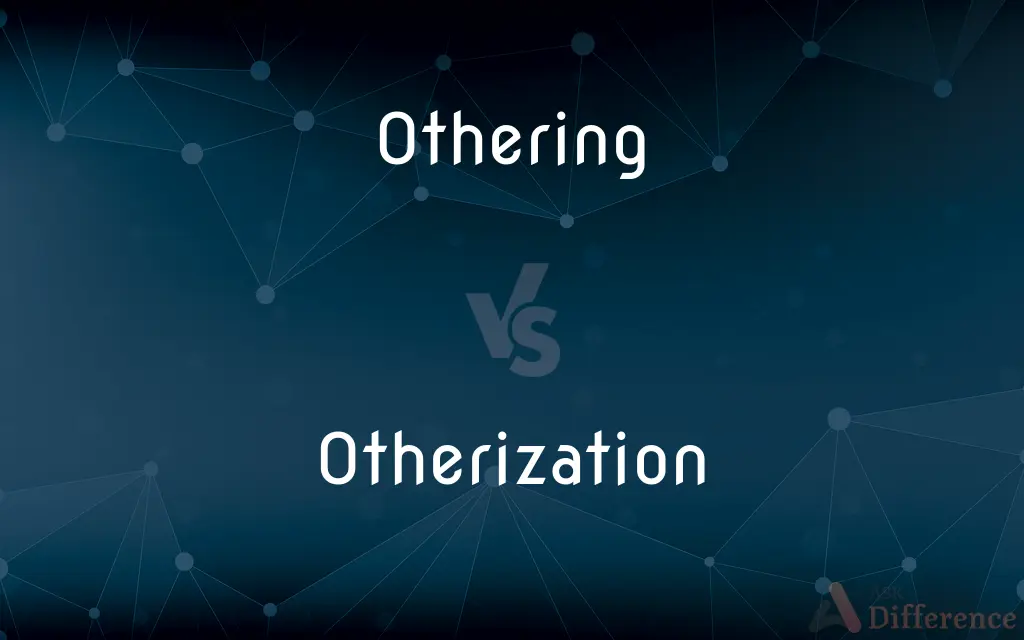Othering vs. Otherization — What's the Difference?
By Fiza Rafique & Maham Liaqat — Updated on April 24, 2024
Othering involves viewing and treating people as fundamentally different, often lesser, whereas otherization explicitly transforms these differences into societal or cultural exclusion.

Difference Between Othering and Otherization
Table of Contents
ADVERTISEMENT
Key Differences
Othering is a psychological and social process where individuals or groups are seen as distinctly different from and inferior to oneself or one's own group, which leads to a perceived division between "us" and "them." In contrast, otherization takes this concept a step further by institutionalizing these differences, turning them into systematic exclusion from social, political, or economic participation.
Othering often manifests subtly through language, attitudes, and social interactions, subtly reinforcing stereotypes and prejudices. Otherization, on the other hand, is more overt and structured, potentially embedded in policies or legal frameworks that explicitly segregate or discriminate against certain groups.
While othering can occur in casual, everyday interactions and might not always result in tangible harm, otherization is typically backed by power structures and has significant and harmful impacts on those who are othered. This institutional approach creates barriers that are hard to dismantle.
The dynamics of othering can be unintentional and unrecognized by those who perpetuate it, stemming from unconscious biases. Conversely, otherization is usually a deliberate action or policy aimed at marginalization, often used by those in power to maintain status quo.
Both othering and otherization contribute to social and cultural fragmentation, but the methods and outcomes of otherization are generally more severe, leading to systemic inequality and social strife.
ADVERTISEMENT
Comparison Chart
Definition
The perception of being different and inferior.
The act of making others different and excluded.
Nature
Psychological and social.
Institutional and structural.
Manifestation
Subtle, through biases and social interactions.
Explicit, through policies and laws.
Intentionality
Often unconscious and unintentional.
Deliberate and systematic.
Impact
Social division and personal bias.
Systemic exclusion and discrimination.
Compare with Definitions
Othering
To perceive others as not belonging to one's own group.
In many societies, othering creates a visible divide between locals and immigrants.
Otherization
Policies or practices that marginalize.
Workplace otherization might manifest in hiring practices that favor one group over another.
Othering
Emphasizes differences rather than commonalities.
Political rhetoric often involves othering opposing parties as entirely distinct in values and priorities.
Otherization
Institutionalized othering leading to tangible exclusions.
Otherization can be seen in educational systems where access and quality differ drastically by race or ethnicity.
Othering
Psychological distancing from others.
Othering can happen even in diverse communities, where subtle cues differentiate us from them.
Otherization
The act of making others culturally or socially excluded.
Otherization in urban planning can lead to segregated neighborhoods with unequal resources.
Othering
Seeing someone as fundamentally different.
Othering often occurs when individuals stereotype those from other cultures.
Otherization
Systematically discriminating against others.
Laws that prevent certain groups from voting are a form of otherization.
Othering
Implies a hierarchy where "the other" is seen as less.
Historical narratives of colonization are filled with examples of othering the indigenous populations.
Otherization
Deliberate segregation based on perceived differences.
Historical apartheid is an extreme example of otherization where laws explicitly enforced racial segregation.
Othering
Gerund of other: the process of perceiving or portraying someone or something as essentially alien or different.
Otherization
The process of otherizing.
Othering
Present participle of other
Common Curiosities
Are there historical examples of otherization?
Yes, apartheid in South Africa and segregation in the United States are examples of otherization where laws and policies explicitly marginalized certain racial groups.
Can othering occur without leading to otherization?
Yes, othering can occur in interpersonal interactions without necessarily leading to institutionalized exclusion, unlike otherization.
What is the primary difference between othering and otherization?
Othering is the perception of others as different and inferior, often subtly; otherization is the systematic exclusion based on these perceived differences.
How do societal norms influence othering and otherization?
Societal norms shape the context and extent to which othering and otherization occur, often reinforcing or challenging these processes.
What roles do education and media play in combatting othering and otherization?
Education and media are crucial in promoting understanding and empathy, challenging stereotypes, and providing balanced representations that can reduce both othering and otherization.
Can othering be positive or necessary in any context?
While typically viewed negatively, some argue that othering can help affirm group identity and solidarity by distinguishing group characteristics, though this is controversial.
Can legislation effectively address otherization?
Legislation can be a powerful tool to combat otherization by enforcing equal rights and protections, although it also requires enforcement and societal support to be effective.
Is othering always intentional?
No, othering can be both unintentional and unconscious, often stemming from ingrained biases and societal conditioning.
How can othering and otherization be addressed in society?
Addressing both requires cultural sensitivity, inclusive policies, and continuous efforts to recognize and dismantle biases and systemic barriers.
What can organizations do to prevent otherization in the workplace?
Organizations can implement inclusive policies, provide diversity training, and foster an environment where all employees feel valued and included.
How do othering and otherization relate to racism?
Both concepts are deeply intertwined with racism, as they involve the devaluation and systemic exclusion of groups based on race and ethnicity.
How does otherization affect individuals on a personal level?
Otherization can lead to feelings of alienation, decreased self-esteem, and a diminished sense of belonging, affecting mental and emotional well-being.
Are there any psychological theories that explain why othering occurs?
Yes, several theories including Social Identity Theory and In-group/Out-group Bias explain how and why individuals categorize others as different and inferior to strengthen their own identity and group cohesion.
How do othering and otherization influence political rhetoric?
Political rhetoric often uses othering to delineate "us" versus "them," influencing voter perceptions and potentially leading to policies that enact otherization.
What impact does otherization have on social cohesion?
Otherization undermines social cohesion by creating divisions and fostering resentment and inequality, which can lead to conflict and instability.
Share Your Discovery

Previous Comparison
Convene vs. Reconvene
Next Comparison
Pilipino vs. FilipinoAuthor Spotlight
Written by
Fiza RafiqueFiza Rafique is a skilled content writer at AskDifference.com, where she meticulously refines and enhances written pieces. Drawing from her vast editorial expertise, Fiza ensures clarity, accuracy, and precision in every article. Passionate about language, she continually seeks to elevate the quality of content for readers worldwide.
Co-written by
Maham Liaqat














































